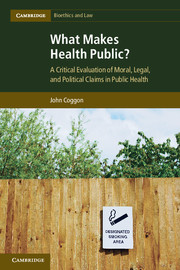 What Makes Health Public?
What Makes Health Public? Book contents
- Frontmatter
- Contents
- Foreword
- Acknowledgements
- What makes health public?
- Part I Basic concepts in public health
- 1 Health, normativity, and politics
- 2 The public, and things being public
- 3 The seven faces of public health
- 4 Public health policy
- 5 Public health law and ethics
- 6 Conclusion to Part I
- Part II Evaluating evaluations: making health public
- Part III Tackling responsibility: liberal citizens as subjects and sovereigns
- Bibliography
- Index
- References
1 - Health, normativity, and politics
from Part I - Basic concepts in public health
Published online by Cambridge University Press: 05 June 2012
- Frontmatter
- Contents
- Foreword
- Acknowledgements
- What makes health public?
- Part I Basic concepts in public health
- 1 Health, normativity, and politics
- 2 The public, and things being public
- 3 The seven faces of public health
- 4 Public health policy
- 5 Public health law and ethics
- 6 Conclusion to Part I
- Part II Evaluating evaluations: making health public
- Part III Tackling responsibility: liberal citizens as subjects and sovereigns
- Bibliography
- Index
- References
Summary
Introduction
If we are concerned to know what practical imperatives health can give rise to, we need to know what it is. This chapter presents the framing of theoretical arguments on this issue. The conceptual points raised can then be applied to the distinct substantive conceptions of health that fall under consideration throughout the book. I should be clear that the debates on how best to understand health do not seem close to resolution, and I do not intend to try to find a final answer. The simple truth is that health means many things, and it is practically futile to approach a general analysis of public health as if this were not the case. Rather, analysts need to be prepared to recognise what issues might be raised when the term ‘health’ is presented in an argument or policy document. With a view to this end, I consider the three most pressing points of contention that arise, and see how they relate to political evaluation of health-related issues.
Health and three dichotomies
Two apparent quandaries beset normative analyses concerning health. First, people tend to take it as analytic that health is good, yet there is considerable resistance to its taking consistent priority, or being a fundamental value to govern our lives. This challenge is not quite as problematic as it seems. Many moral and political theories accommodate plural goods without incoherence or contradiction. Equally, many theories accommodate the fact that people behave in ways that they would themselves consider irrational, foolish, or harmful. For some a natural response to people’s disregard for health is to seek a means of sharing responsibility for it (amongst other things), and through a political society not leave government of every health issue to the wisdom of each individual. The second quandary that may prove problematic can be seen in one of two ways, and presents a more insidious difficulty: either no one quite knows what health is, making it a nebulous subject of analysis and policy; or too many people ‘know’ what it means, but they contradict each other in the certainty of their knowledge. A root problem, then, is not just to relate concerns for health with those for other important goods; it is to ascertain that when someone mounts an argument about health we understand at least approximately what it is about. In the following three sections, I will highlight three dichotomies that feature prominently in debates over the meaning of health. It is essential to have an awareness of them, and where critiques are formed to take a position on them. Doing so helps analysts to overcome the problem of conceptual opacity when discussions claim to be about health. Before engaging with health as it features in policy or argument, it is necessary to recognise that it may be used as a ‘normativist’ or ‘naturalist’ concept; that it may be ‘negative’ or ‘positive’; and that assessments of health may be made from ‘internal’ or ‘external’ perspectives. It is important also to emphasise that the first dichotomy represents a mutually exclusive pairing; the latter two can coherently be employed simultaneously.
- Type
- Chapter
- Information
- What Makes Health Public?A Critical Evaluation of Moral, Legal, and Political Claims in Public Health, pp. 11 - 23Publisher: Cambridge University PressPrint publication year: 2012


